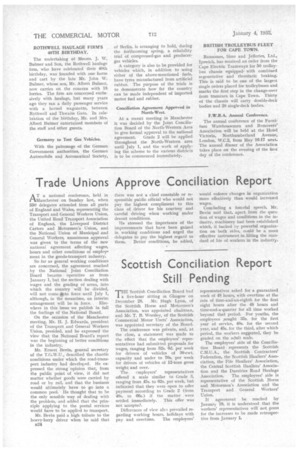Trade Unions Approve Conciliation Report
Page 34

If you've noticed an error in this article please click here to report it so we can fix it.
AT a national conference, held in Manchester on Sunday last, when 550 delegates attended from all parts of England and Wales, representing the Transport and General \Yorkers Union, the United Road Transport Association of England, the Liverpool District Carters and Motormen's Union, and the National Union of Municipal and General Workers, unanimous approval was given to the terms of the new national agreement affecting wages, hours and other conditions of employment in the goods-transport industry.
So far as general working conditions are concerned, the agreement reached by the National Joint Conciliation Board became operative as from January 1, but the section dealing with wages and the grading of areas, into which the country will be divided, will not come 411to force until jnly 1, although, in the meantime, an interim
arrangement will be in force. Elsewhere in this issue we publish in full the findings of the National Board.
On the occasion of the Manchester meeting, Mr. H. J. Edwards, president of the Transport and General Workers Union, presided, and he expressed the view that the National Board's report was the beginning of better conditions in the industry.
Mr. Ernest Bevin, general secretary of the T.G.W.U., described the chaotic conditions under which the road-transport industry had developed. He expressed the strong opinion that from the public point of view, it did not matter whether goods were carried by road or by rail, and that the business would ultimately have to go into a common pool. He thought that to be the only sensible way of dealing with the problem, and added that the principle applying to the postal services would have to be applied to transport.
Mr. Bevin paid a high tribute to the heavy-lorry driver when he said that n24 there was not a chief constable or responsible public official who would not pay the highest compliment to this class of driver for his courtesy and careful driving when working under decent conditions.
He stressed the importance of the improvements that have been gained in working conditions and urged the delegates to pay the highest regard to them. Better conditions, he added, would enforce changes in organization more effectively than would increased wages.
Concluding a forceful speech, Mr. Bevin said that, apart from the question of wages and conditions in the industry, machinery had been established which, if backed by powerful organization on both sides, could be a most effective instrument in lifting the standard of life of workers in the industry.




















































































